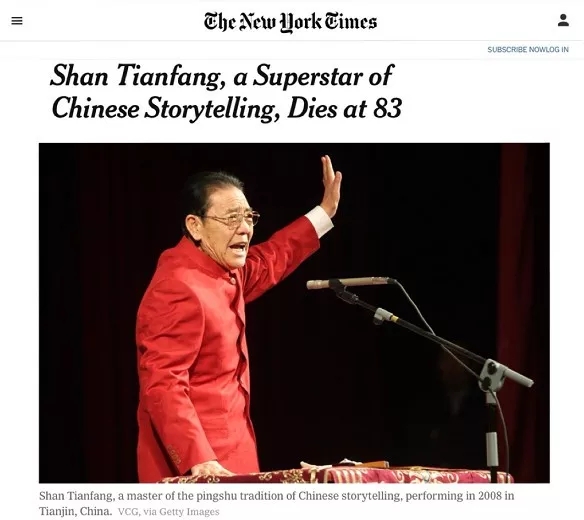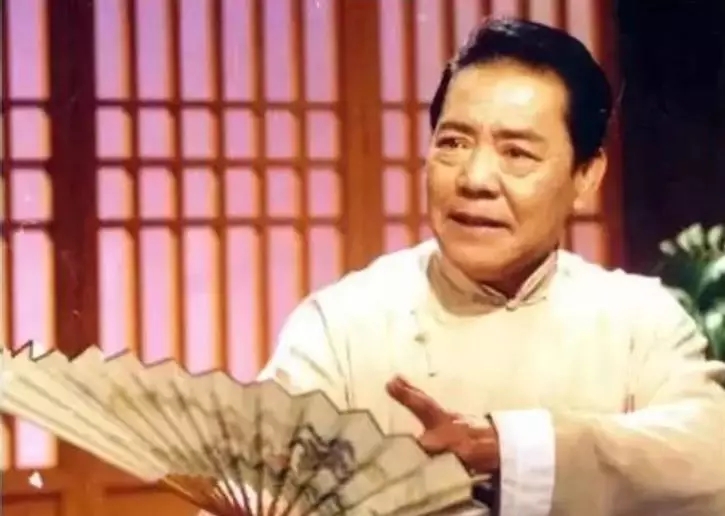“欲知后事如何,且聽(tīng)下回分解。”
一桌、一椅、一扇、一撫尺,評(píng)書(shū)表演藝術(shù)家單田芳講述著一段段歷史傳奇,各方英雄好漢、亂世梟雄紛紛登場(chǎng)。
2018年9月11日,評(píng)書(shū)大師單田芳因病逝世。國(guó)內(nèi)媒體報(bào)道、紀(jì)念單田芳的同時(shí),美國(guó)《紐約時(shí)報(bào)》(The New York Times)也發(fā)布了長(zhǎng)文訃告(obituary),回顧他作為說(shuō)書(shū)人的一生,緬懷單田芳。

在文章開(kāi)篇,《紐約時(shí)報(bào)》評(píng)價(jià)他:“將古老的評(píng)書(shū)傳統(tǒng)推向現(xiàn)代,讓幾代中國(guó)人得以欣賞。”
Shan Tianfang, a storyteller whose energetic oral renditions of classical Chinese novels and historical events propelled the ancient pingshu tradition into the modern age for generations of Chinese, died on Sept. 11 in Beijing. He was 83.
說(shuō)書(shū)人單田芳于9月11日在北京去世,享年83歲。他對(duì)中國(guó)古典小說(shuō)和歷史事件做出充滿激情的演繹,將古老的評(píng)書(shū)傳統(tǒng)推向現(xiàn)代,讓幾代中國(guó)人得以欣賞。
rendition n. 譯文;演奏
早年時(shí)光:曾未想入此行
回顧單田芳的一生,文中寫(xiě)道:上世紀(jì)50年代,說(shuō)書(shū)這一行業(yè)社會(huì)地位低下,出生于民間藝人家庭的單田芳并未想過(guò)走上這一行。
單田芳
Mr. Shan tried for many years to avoid becoming a performer of pingshu, the Song dynasty-era storytelling tradition. Growing up in 1950s China in a family of folk art performers, he had seen struggle firsthand. It was a life of constant financial troubles and low social status.
單田芳曾經(jīng)并不希望成為這種源于宋代的故事講說(shuō)傳統(tǒng)的表演者。他在20世紀(jì)50年代中國(guó)的一個(gè)民間藝人家庭長(zhǎng)大,親眼目睹了這一行的艱難。那是一種持續(xù)處于經(jīng)濟(jì)困境、社會(huì)地位低下的生活。
So it was with great reluctance when, out of financial necessity, he became an apprentice to a family friend who was a master of pingshu. He made his debut in 1956.
因此,當(dāng)他出于生計(jì)上的需要,拜一個(gè)評(píng)書(shū)大師為師,他也是單田芳的家族朋友。當(dāng)時(shí)單田芳非常不情愿,1956年,他首次登臺(tái)演出。
評(píng)書(shū)是怎樣的一種藝術(shù)形式呢?看《紐約時(shí)報(bào)》是如何描寫(xiě)的:
In the pingshu tradition, the performer wears a traditional gown and sits behind a desk equipped with a folding fan and a wooden block, which is used like a gavel. The storyteller recounts a legend — typically a classical Chinese epic — from memory, using different voices and exaggerated gestures as well as adding occasional background detail and commentary.
在評(píng)書(shū)傳統(tǒng)中,表演者身著傳統(tǒng)的長(zhǎng)袍,坐在桌子后面。桌上有一把折扇和一個(gè)作醒木之用的木塊。說(shuō)書(shū)人講述通常來(lái)自中國(guó)古典史詩(shī)的傳奇故事。他們根據(jù)記憶來(lái)表演,使用不同的聲音、夸張的手勢(shì),偶爾還加入背景細(xì)節(jié)和評(píng)論。
即便入行時(shí)并不情愿,但后來(lái),他漸漸地愛(ài)上了這一行。
更難能可貴的是,他精益求精。
單田芳仔細(xì)鉆研,研究歷史,在古典史詩(shī)中發(fā)現(xiàn)的歷史錯(cuò)誤、迷信幻想,他都能基于自己的研究進(jìn)行糾正,并用獨(dú)樹(shù)一幟的風(fēng)格進(jìn)行詮釋?zhuān)?/p>
Mr. Shan grew to love the storytelling form, which is popular across northern China. It is a demanding profession that combines acting, oration, writing, historical research and literary criticism and requires countless hours of memorization.
單田芳漸漸喜歡上了這種在中國(guó)北方流行的講故事方式。這是一個(gè)要求很高的職業(yè),集表演、演說(shuō)、寫(xiě)作、歷史研究和文學(xué)評(píng)論于一體,需要記憶無(wú)數(shù)個(gè)小時(shí)的材料。
But bothered by what he felt were the many historical inaccuracies and superstitious fantasies found in the classical epics, Mr. Shan, who had studied history, soon began performing his own interpretations based on his meticulous historical research.
不過(guò),在古典史詩(shī)中發(fā)現(xiàn)的許多歷史錯(cuò)誤和迷信幻想令單田芳感到煩惱。基于自己對(duì)歷史的研究,他很快就開(kāi)始用自己的詮釋和理解進(jìn)行表演。
有了這樣的基礎(chǔ),在東北地區(qū)的許多茶館里,他以對(duì)經(jīng)典的新穎演繹而聞名。

廣播時(shí)代:聲名鵲起
文革時(shí)期,單田芳說(shuō)書(shū)的工作一度中斷,文革結(jié)束以后,隨著時(shí)代發(fā)展,單田芳發(fā)現(xiàn)傳統(tǒng)的茶社說(shuō)書(shū)形式已經(jīng)不能滿足觀眾的需要。
機(jī)緣巧合之下,單田芳得到了通過(guò)廣播電臺(tái)說(shuō)書(shū)的機(jī)會(huì)。但他卻發(fā)現(xiàn),錄音室里和在茶社不同,沒(méi)有道具,也看不到聽(tīng)書(shū)人的反應(yīng)。
他是如何做的呢?
So for his first radio performance, an abridged version of the historical novel “The Romance of Sui and Tang Dynasties,” Mr. Shan used the studio’s three recording technicians as his audience and adjusted his performance based on their reactions.
因此,在他的第一次廣播演出——節(jié)略版的歷史小說(shuō)《隋唐演義》中,單田芳用了演播室三名錄音師作為觀眾,根據(jù)他們的反應(yīng)對(duì)自己的表演進(jìn)行調(diào)整。
借助廣播的力量,這次評(píng)書(shū)有1億多中國(guó)觀眾收聽(tīng),單田芳聲名鵲起:
The performance had its premiere in 1980 on Chinese New Year, and more than 100 million Chinese were estimated to have tuned in during the 56 hours over which it was broadcast. It was the beginning of a dramatic second act both for Mr. Shan and for pingshu in the People’s Republic of China. He was soon a household name across the country.
這次表演于1980年在中國(guó)農(nóng)歷新年首播,在播出的56個(gè)小時(shí)里,估計(jì)有超過(guò)1億中國(guó)觀眾收聽(tīng)。對(duì)于單田芳和中國(guó)評(píng)書(shū)來(lái)說(shuō),這都標(biāo)志著戲劇性的第二春的開(kāi)始。他很快在全國(guó)家喻戶曉。
后來(lái),單田芳為廣播和電視錄制了大量的評(píng)書(shū)故事,《紐約時(shí)報(bào)》列出了一串讓人驚嘆的數(shù)字:
Over six decades, Mr. Shan recorded more than 110 stories for radio and television totaling about 12,000 episodes and spanning 6,000 hours. His best-known works include his renditions of Chinese classics like “White-Eyebrow Hero” and “Sanxia Wuyi” and his dramatizations of historical figures like Zhuge Liang and Lin Zexu.
60多年來(lái),單田芳為廣播和電視錄制了110多個(gè)故事,總共約12000集,時(shí)長(zhǎng)6000小時(shí)。他最著名的作品包括對(duì)《白眉大俠》、《三俠五義》等中國(guó)經(jīng)典名著的演繹,以及對(duì)諸葛亮、林則徐等歷史人物的戲劇化改編。
時(shí)至今日,單田芳在中國(guó)仍舊廣受觀眾歡迎:
Even today, hop into a Beijing taxi and the driver may be listening to one of Mr. Shan’s recordings.
即使在今天,如果你坐上一輛北京出租車(chē),司機(jī)可能還是在聽(tīng)單田芳的錄音。
《紐約時(shí)報(bào)》采訪了一位48歲的出租車(chē)司機(jī),他說(shuō),單田芳能把復(fù)雜故事簡(jiǎn)單化,聽(tīng)著“特別帶勁兒”。
“For my generation, Shan Tianfang was a master,” said Zhao Fuwei, 48, a Beijing taxi driver. “If back then there was such thing as a viral star, then Shan Tianfang was definitely the hottest viral star.”
“對(duì)我們這代人來(lái)說(shuō),單田芳就是一個(gè)大師,”48歲的北京出租車(chē)司機(jī)趙福為(音)說(shuō),“過(guò)去是沒(méi)有網(wǎng)紅一說(shuō),要是像現(xiàn)在這樣,那單老爺子準(zhǔn)是網(wǎng)紅。”
“Listening to his stories has made it easier to kill time in bad traffic,” Mr. Zhao added. “He was so good at making complicated historical stories simple and interesting. You feel like you could relate to the characters in his stories, even though they lived a long time ago.”
“北京這破路,堵死,聽(tīng)聽(tīng)書(shū)還舒服點(diǎn),”趙先生接著說(shuō),“人家能把復(fù)雜故事簡(jiǎn)單化,聽(tīng)著特別帶勁兒。雖然他講的都是古人的事,但是你能感覺(jué)到自己和這些人物能產(chǎn)生共鳴。”
藝術(shù)人生
文章介紹說(shuō),單田芳出生于演藝世家。本夢(mèng)想當(dāng)一名醫(yī)生,卻由于家庭變故,接過(guò)了家里做表演行當(dāng)?shù)囊吕彛?/p>
Shan Chuanzhong was born on Dec. 17, 1934, in Tianjin, China. His mother, Wang Xianggui, was a stage actress. His father, Shan Yongkui, was a folk musician who played the sanxian, a three-stringed Chinese lute.
單傳忠(單田芳本名——譯注)于1934年12月17日在中國(guó)天津出生。他的母親王香桂是一名舞臺(tái)演員。他的父親單永魁則是一名民間音樂(lè)家,主要演奏一種名叫“三弦”的中國(guó)彈撥樂(lè)器。
Growing up, Mr. Shan and his four sisters frequently moved around northeastern China with their parents, an experience that left him longing for a more stable life and career. But in the early 1950s, when his parents divorced and his mother left the family, Mr. Shan gave up his dream of being a doctor and embraced his performance heritage.
在成長(zhǎng)的過(guò)程中,單田芳和他的四個(gè)妹妹在中國(guó)東北地區(qū)頻繁搬家。因?yàn)橛兄@樣的一段經(jīng)歷,單田芳非常希望擁有一個(gè)穩(wěn)定的生活和工作。但是,在20世紀(jì)50年代早期,他的父母離異,母親離開(kāi)了這個(gè)家。而從那以后,單田芳就放棄了當(dāng)醫(yī)生的夢(mèng)想,接過(guò)了家里做表演行當(dāng)?shù)囊吕彙?/p>
他先跟著一個(gè)評(píng)書(shū)師父做學(xué)徒,學(xué)成后加入了一個(gè)民間曲藝團(tuán)。這個(gè)團(tuán)體駐扎在鞍山,而在那時(shí)候,這個(gè)東北小鎮(zhèn)正是一個(gè)以茶館和評(píng)書(shū)聞名的地方。
文革期間,他的演藝生涯因此沉寂,而文革之后的20世紀(jì)80年代,單田芳享譽(yù)全國(guó)。
2007年,單田芳退休。在評(píng)書(shū)這種藝術(shù)形式已經(jīng)逐漸成為“小眾”的時(shí)代,他的事業(yè)仍在延續(xù)。《紐約時(shí)報(bào)》寫(xiě)道:
But in recent years many of the great pingshu performers have died, and the tradition is fading. By the time Mr. Shan retired in 2007, interest in pingshu among Chinese had all but been replaced by mobile phones and gaming.
然而近年來(lái),許多優(yōu)秀的評(píng)書(shū)人都相繼去世,這一傳統(tǒng)也在逐漸消失。到了2007年單田芳退休的時(shí)候,中國(guó)人對(duì)評(píng)書(shū)的興趣已經(jīng)被手機(jī)和游戲所取代。
Nevertheless, even after retiring, Mr. Shan worked tirelessly to promote pingshu among young Chinese, mentoring apprentices and starting a school dedicated to the folk arts.
然而,即使在退休后,單田芳也依然辛勤地工作,在中國(guó)年輕人當(dāng)中推廣評(píng)書(shū)、教導(dǎo)學(xué)徒,還辦了一家民間藝術(shù)學(xué)校。
而對(duì)于生活中出現(xiàn)的新科技,單田芳始終抱著接納的態(tài)度:
Ever willing to adapt to new technologies, he posted a message to his Sina Weibo microblog account on Sept. 6, five days before his death. It was an announcement about a new live-streamed lecture series about pingshu.
對(duì)于生活里出現(xiàn)的新科技,單田芳始終抱著接納的態(tài)度。在他去世的前五天,也就是9月6日,他還在他的新浪微博賬號(hào)上發(fā)送了一條消息。在那條微博里,他向大家宣布,他的線上評(píng)書(shū)公開(kāi)課開(kāi)講了。
(來(lái)源:中國(guó)日?qǐng)?bào)雙語(yǔ)新聞編輯部)
